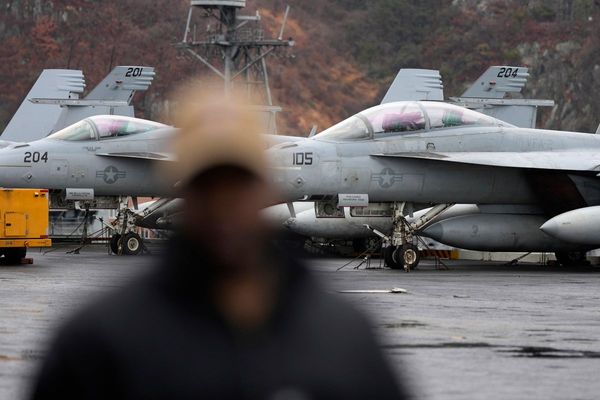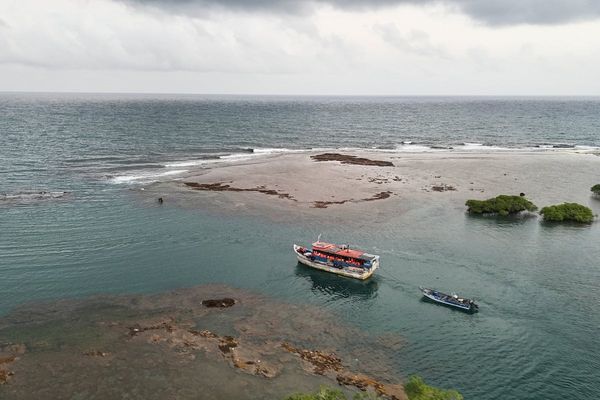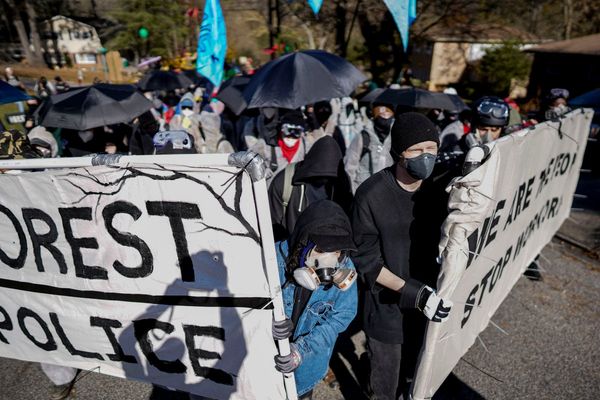
JIM’S BIG SURPLUS
Treasurer Jim Chalmers will today confirm the 2023-24 budget will record a surplus of $15.8 billion, Guardian Australia reports, $6 billion higher than forecast in the May budget announcement. Labor says the better-than-expected surplus — the first consecutive one in 15 years — is “entirely” due to lower government spending.
“We’re the first government to post back-to-back surpluses in nearly two decades. A second straight surplus is proof of our responsible economic management,” Chalmers said in a statement.
The Age reports this is the first consecutive Labor surplus since Paul Keating’s in 1988-89 and 1989-90. Despite the good budget news, the paper also points out that Australia’s gross debt has climbed and on Friday reached a record $933.1 billion — though Labor will take some solace in the fact this is less than the $1.1 trillion initially forecast by Josh Frydenberg back in 2020-21.
Funnily enough, The Australian is making no mention of the increased surplus, instead focusing on a poll that shows Labor’s primary vote has fallen to “a historical low” in NSW, alleging it could cost the government up to four seats in the state.
According to the Newspoll, the swing against Labor has come primarily from middle-aged voters aged 50-64, with this demographic also choosing Peter Dutton as their preferred prime minister for the first time.
Meanwhile, things are going from bad to worse for the ALP in Queensland, with the AAP reporting that experts expect a big swing against the Labor government in the October election. Despite Premier Steven Miles introducing a raft of popular, concession-based cost of living measures, it looks unlikely that Labor will retain power in the Sunshine State.
“Anything on the Labor side that’s (held by a margin of) 10% and under is at risk,” according to Associate Professor Paul Williams, a Griffith University political commentator of 40 years.
FEARS OF WAR GROW
Fears of all-out war in the Middle East have grown as Israel continues its simultaneous bombing of Gaza, Lebanon and, now, Yemen.
Al Jazeera reports that, so far today (at time of writing), Israel has killed 28 Palestinians and 82 in Lebanon in a series of strikes. The newest wave of attacks comes after Israel assassinated Hezbollah’s leader Hassan Nasrallah on Friday, the latest in a series of blows against the organisation that have left hundreds of civilians dead in Lebanon.
The ABC reports that many in Lebanon are refusing to believe Nasrallah has been killed, despite his death being confirmed by both Hezbollah and the Israel Defense Forces.
“Everyone is saying that he is alive. They spread rumours saying he is dead, but he is alive and they hid him,” said Fatme Hosni el Age, who fled Lebanon’s south in the wake of the bombings. A Hezbollah militant, also speaking to the ABC, said that the group’s next leader will be “harder line”, with speculation that it could be Nasrallah’s cousin, Hashem Safieddine.
The increased attacks on Lebanon, and the new attacks on Yemen, have led to increased speculation that Iran may join the fray in support of Israel’s enemies. The BBC reports that Iran has yet to retaliate for the assassination of Hamas’ political leader Ismail Haniyeh in July, which embarrassingly occurred in a Tehran guesthouse.
The outlet suggests that while Iran may ask its militant allies to step up attacks on Israeli and US targets in the region, it will probably stop short of “triggering a war that it cannot hope to win”.
CNN is reporting that US President Joe Biden will speak with Israeli Prime Minister Benjamin Netanyahu “soon”, with American officials reportedly infuriated that the latter brushed off a 21-day Israel-Lebanon ceasefire proposal after being led to believe he was on board.
“We’ve already taken precautions relative to our embassies and personnel who want to leave, but we’re not there yet. But we’re working like hell with the French and many others,” said Biden.
ON A LIGHTER NOTE…
The Americans call them “mom-and-pop” stores — small businesses, usually run by families, which offer a more personalised shopping experience — as well as (on occasion) a vastly superior product.
While many small brick-and-mortar shops have been priced out of business in Australia and across the world by massive retailers, it seems that the lower-overhead roadside produce stall might be having a moment.
With major Australian supermarkets about as popular as a raw onion sandwich, those with discretionary income (and the time to spare) are heading to the roadside for their fresh groceries, with some growers enjoying increased fruits of their labour.
Nikki and Chris Baldock, who sell their produce exclusively roadside, have enjoyed a bumper year in 2024. They say that the freshness of produce and competitive pricing make buying from stalls a no-brainer.
“Sometimes people ask why … our mandarins taste so good,” Mr Baldock said.
“It’s just because they are fresh. Fresh off the tree. They are not three weeks old from one of the larger stores.”
Say What?
You won’t be able to destroy us, whatever you do, however much you bomb, however much you displace people — we will stay here. We won’t leave. This is our country and we’re staying.
Francoise Azori
The Beirut resident was defiant when asked about Israel’s increased aggression in her country.
CRIKEY RECAP

There’s a wee hint of glee in the James Bond compassions, isn’t there? A near-imperceptible fist pump into the air. It’s the same feeling one might get watching a James Bond film and seeing the sophisticated, complex, audacious, carefully planned manoeuvres of the hero as he whirls and twirls his vehicle to safety while the bad guy careens off a cliff. It is, if nothing else, righteous and impressive.
But James Bond is simply not real life. In real life Israel’s pager attacks killed two children and were likely a violation of international law, a possible war crime, and/or a form of terrorism that paved the way for airstrikes, which then killed more than 500 Lebanese people in a single day, making it the country’s highest daily death toll in recent memory. Tens of thousands of people are now internally displaced and the region is on the brink of war.
Labor has a long and messy history with negative gearing and capital gains tax reform. In 1985, the Hawke government abolished negative gearing for all future rental property investors, “[quarantining] any losses made from owning rental properties” so that the losses “could not be used to reduce tax on other sources of assessable income”, in the words of Jim O’Donnell, a solicitor who published a paper on the policy in 2005.
The Hawke government reversed the changes in 1987, despite the then treasurer Paul Keating suggesting in an August 1987 cabinet submission that “with the notable exception of Sydney, conditions in the residential rental property market [had not become] unusually tight”, as ABC News reported in a fact-check piece in 2015.
“There was such a pile-on that they had to put it back,” financial journalist Alan Kohler told Crikey.
The Greens are NIMBYs.
The Greens do not believe in abundance; they believe in scarcity.
The Greens do not believe that markets, even if robustly supported by government, are capable of improving people’s lives.
The Greens do not believe that the incentives of profit-making enterprises can ever be aligned with the interests of their customers and employees, and serve only to extract rents from them like parasites.
The Greens are certainly not positive-sum economic thinkers. But they’re not even zero-sum economic thinkers. The Greens are negative-sum economic thinkers.
And so, before they even get started on achieving their laudable goal of building a million new homes, they’ve taken off the table all the forces that could be marshalled to achieve that outcome.
READ ALL ABOUT IT
Young Lebanese girl left fighting for life after Israeli strikes (BBC)
Trump repeats insults of Harris after rebukes from both sides (The New York Times) ($)
Exit polls indicate Austria’s far-right party has won national election (Euronews)
In parts of Australia, unborn babies aren’t legally seen as people. Here’s why that needs to change (The Conversation)
The Indigenous ‘watchmen’ safeguarding Peru’s isolated tribes (Al Jazeera)
THE COMMENTARIAT
The peace appeals of Israel’s Western enablers are a cynical charade — Andrew Mitrovica (Al Jazeera): You cannot negotiate a ceasefire, let alone peace, with a man who prefers to wage war.
That is the conundrum facing a host of suddenly fretting Western leaders, led by retiring US President Joe Biden, who insist — publicly, at least — that they are working hard to prevent another, cataclysmic war from engulfing the Middle East.
Let’s pretend for a moment that their “concerns” are sincere. Then, these same Western leaders ought to acknowledge finally that they are, in large measure, responsible for that pressing conundrum. Long before October 7, 2023, Biden and company have, at every turn, enabled, armed, and provided diplomatic cover for their “man” in Tel Aviv — Israeli Prime Minister Benjamin Netanyahu and his extremist government.
Now I’ve witnessed a Swans car crash, I can finally call myself a proper fan — Michael Koziol (The Sydney Morning Herald): It has been a year of ecstatic highs and horrific lows. It’s bizarre a team capable of producing such brilliance could be crushed by Port Adelaide to the tune of 112 points, or show such grit and steel in the qualifying final but fail to match that in the big dance. It seems random and unpredictable; and yet the Swans’ grand final performances have now become, sadly, all too predictable.
On Sunday morning, I trudged through the Melbourne rain, sans umbrella, to collect my bags from where I’d stored them after landing on an early pre-final flight. It felt like a grim and fitting walk of shame. I couldn’t quite bring myself to wear my Swans scarf.







